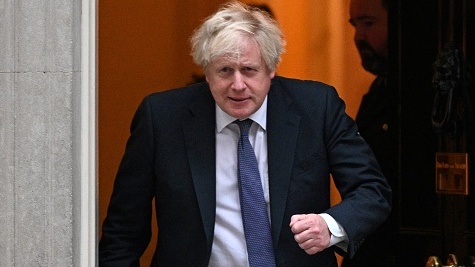The rival plans on sleaze from Labour and the Conservatives
Labour say Johnson’s new proposals are ‘not specific’ and ‘watered down’

A free daily email with the biggest news stories of the day – and the best features from TheWeek.com
You are now subscribed
Your newsletter sign-up was successful
Boris Johnson has set out new proposals to ban MPs from taking second jobs as consultants as the so-called sleaze crisis threatens to engulf his party and Westminster.
The prime minister “caved in” to pressure to take action on MPs’ second jobs ahead of a “potentially embarrassing” Commons vote on Labour demands to end MPs taking lucrative outside consultancy and lobbying work, said The Independent.
The prime minister announced his own proposals yesterday, outlining two changes to current rules, both of which are recommendations from a 2018 report by the Committee on Standards in Public Life.
The Week
Escape your echo chamber. Get the facts behind the news, plus analysis from multiple perspectives.

Sign up for The Week's Free Newsletters
From our morning news briefing to a weekly Good News Newsletter, get the best of The Week delivered directly to your inbox.
From our morning news briefing to a weekly Good News Newsletter, get the best of The Week delivered directly to your inbox.
The first change would be a ban on MPs accepting paid work as parliamentary advisers, strategists or consultants, while the second dictates that MPs’ outside work should be “within reasonable limits and should not prevent them from fully carrying out their range of duties”.
The Labour motion called for MPs to be banned from “any paid work to provide services as a Parliamentary strategist, adviser, or consultant”, while Labour leader Keir Starmer said yesterday he wanted to “ban all second jobs for MPs with very limited exceptions” – although the banning of all second jobs for MPs does not appear in the Labour motion.
Government officials claim their proposal “toughens up” the Labour motions by setting limits for outside work, said Politico’s London Playbook. “We’re going further than Labour’s proposals,” a No. 10 official said. But Labour attacked the amendment plans as “not specific” and saying it “waters down” the motion in being a non-binding proposal which “removes the guarantee of a future vote in parliament on banning paid work”.
Johnson announced his plans in a letter to the Commons Speaker Lindsay Hoyle, which he tweeted following yesterday’s afternoon debate on parliamentary sleaze and just ahead of a press conference given by Keir Starmer in which he set out his “five-point plan for cleaning up politics”.
A free daily email with the biggest news stories of the day – and the best features from TheWeek.com
As The Times explained, Labour had planned to use an opposition day to force a vote on banning MPs from paid consultancy and directorships. And while these votes are not binding, Labour believed that because the motion “would require changes from the House of Commons rather than the government, the result would take effect”.
The Telegraph said Johnson had “blindsided” the Labour leader, and the publication of his proposals had effectively “stolen Labour’s thunder on second jobs”.
But the new Conservative proposals are less a political victory for Johnson and more that he was “shamed into yet another U-turn” said The Mirror, adding that the prime minister had “caved to pressure to root out sleaze” put on it by the Labour Party.
Starmer too was keen to hail Johnson’s new proposals as a Labour victory: “Be under no illusion, the prime minister has only done this because his back was against the wall because the Labour Party have put down a binding vote for tomorrow,” he told journalists after his press conference.
“This is a significant victory for the Labour Party; it would not have happened if we hadn’t put down that binding vote.”
So, do Johnson’s proposals go far enough to dampen the second jobs row? asked Stephen Bush in The New Statesman. “In political terms, Johnson’s proposed measures are fraught with risks,” he said.
According to polling, most voters oppose not only MPs working as consultants – as both Labour and Conservative reforms cover – but other types of lucrative second jobs too, like accountants, lawyers and newspaper columnists.
The danger now is that Johnson’s approach “won’t bring the row over second jobs to a close; it may in fact deepen it”.
Sorcha Bradley is a writer at The Week and a regular on “The Week Unwrapped” podcast. She worked at The Week magazine for a year and a half before taking up her current role with the digital team, where she mostly covers UK current affairs and politics. Before joining The Week, Sorcha worked at slow-news start-up Tortoise Media. She has also written for Sky News, The Sunday Times, the London Evening Standard and Grazia magazine, among other publications. She has a master’s in newspaper journalism from City, University of London, where she specialised in political journalism.
-
 Sepsis ‘breakthrough’: the world’s first targeted treatment?
Sepsis ‘breakthrough’: the world’s first targeted treatment?The Explainer New drug could reverse effects of sepsis, rather than trying to treat infection with antibiotics
-
 James Van Der Beek obituary: fresh-faced Dawson’s Creek star
James Van Der Beek obituary: fresh-faced Dawson’s Creek starIn The Spotlight Van Der Beek fronted one of the most successful teen dramas of the 90s – but his Dawson fame proved a double-edged sword
-
 Is Andrew’s arrest the end for the monarchy?
Is Andrew’s arrest the end for the monarchy?Today's Big Question The King has distanced the Royal Family from his disgraced brother but a ‘fit of revolutionary disgust’ could still wipe them out
-
 How corrupt is the UK?
How corrupt is the UK?The Explainer Decline in standards ‘risks becoming a defining feature of our political culture’ as Britain falls to lowest ever score on global index
-
 The high street: Britain’s next political battleground?
The high street: Britain’s next political battleground?In the Spotlight Mass closure of shops and influx of organised crime are fuelling voter anger, and offer an opening for Reform UK
-
 The MAGA civil war takes center stage at the Turning Point USA conference
The MAGA civil war takes center stage at the Turning Point USA conferenceIN THE SPOTLIGHT ‘Americafest 2025’ was a who’s who of right-wing heavyweights eager to settle scores and lay claim to the future of MAGA
-
 Is a Reform-Tory pact becoming more likely?
Is a Reform-Tory pact becoming more likely?Today’s Big Question Nigel Farage’s party is ahead in the polls but still falls well short of a Commons majority, while Conservatives are still losing MPs to Reform
-
 What does the fall in net migration mean for the UK?
What does the fall in net migration mean for the UK?Today’s Big Question With Labour and the Tories trying to ‘claim credit’ for lower figures, the ‘underlying picture is far less clear-cut’
-
 Asylum hotels: everything you need to know
Asylum hotels: everything you need to knowThe Explainer Using hotels to house asylum seekers has proved extremely unpopular. Why, and what can the government do about it?
-
 Five takeaways from Plaid Cymru’s historic Caerphilly by-election win
Five takeaways from Plaid Cymru’s historic Caerphilly by-election winThe Explainer The ‘big beasts’ were ‘humbled’ but there was disappointment for second-placed Reform too
-
 The new age of book banning
The new age of book banningThe Explainer How America’s culture wars collided with parents and legislators who want to keep their kids away from ‘dangerous’ ideas